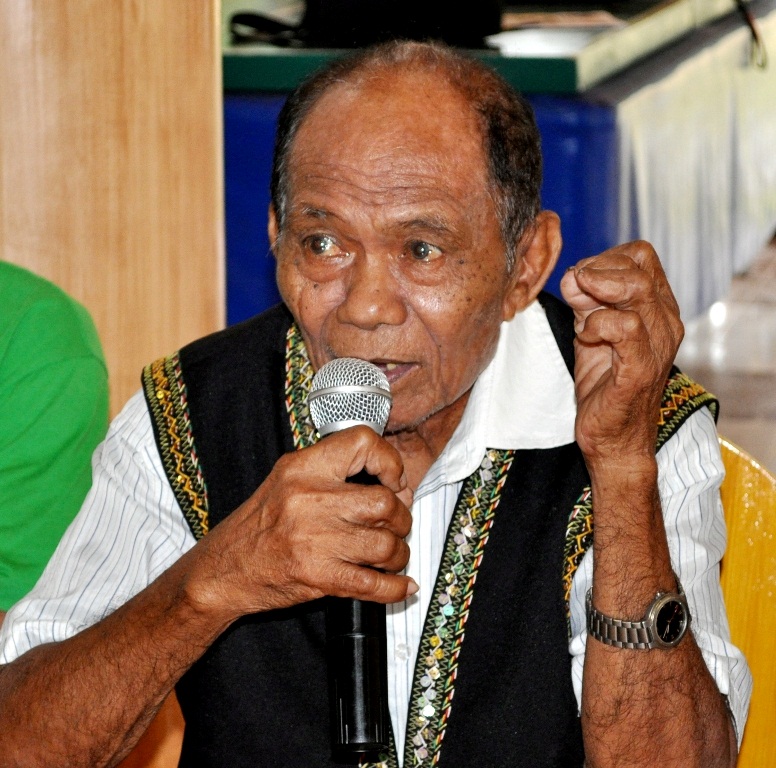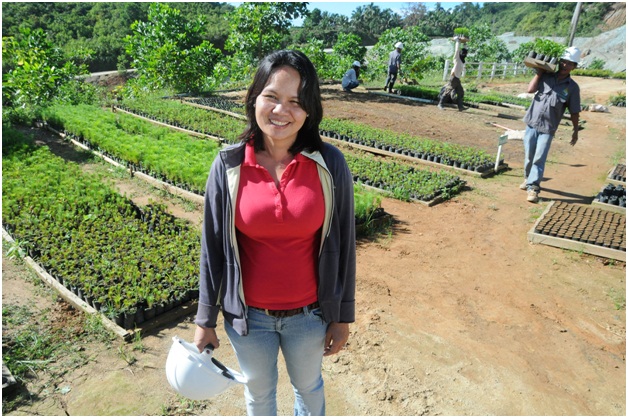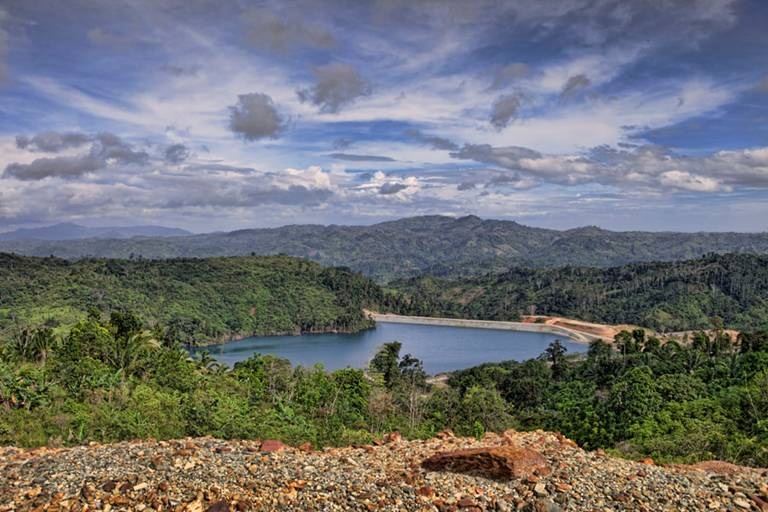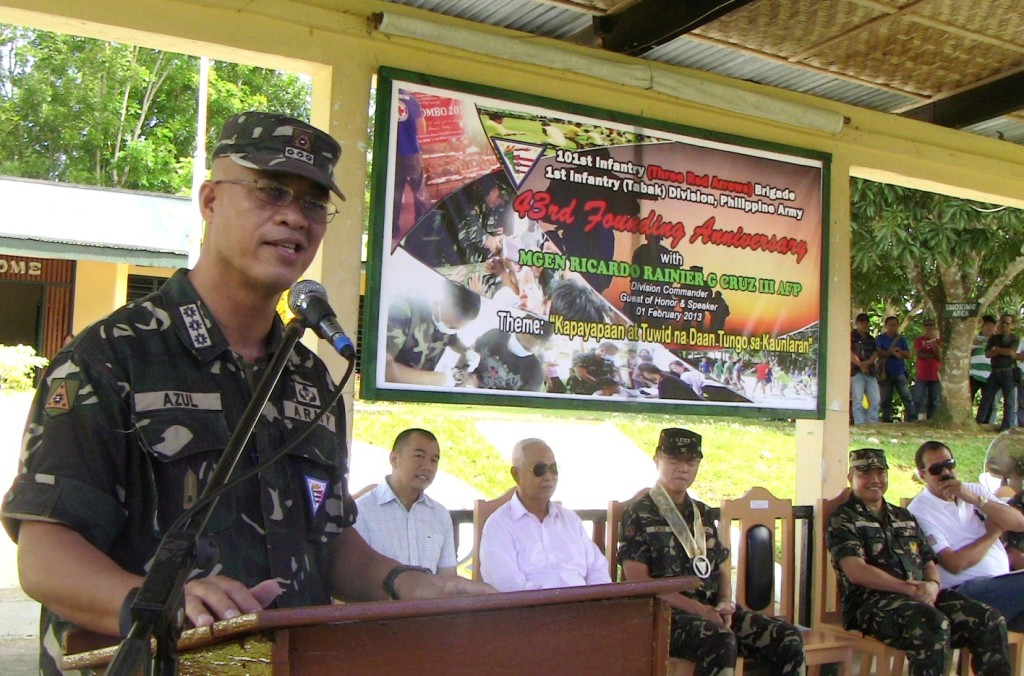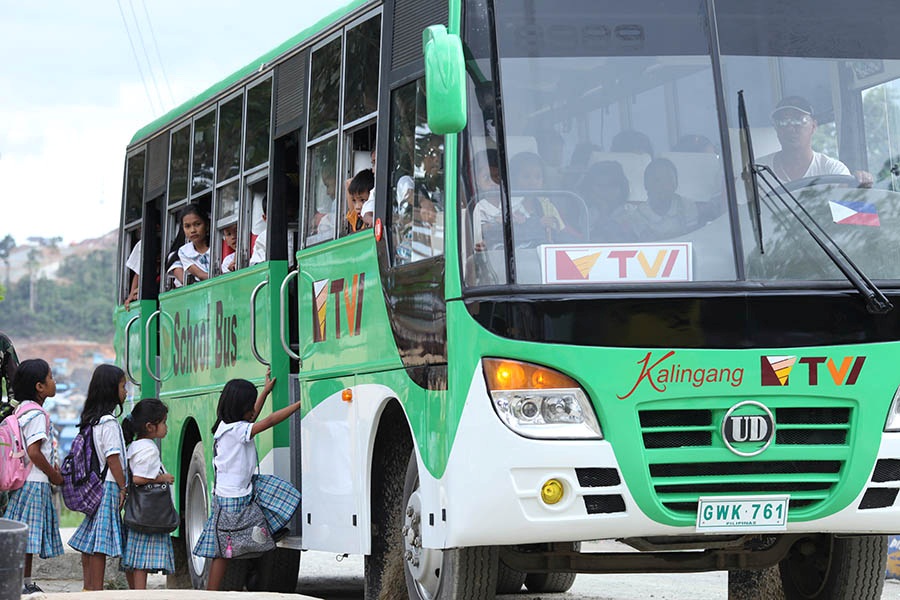A report on TVIRD’s education initiatives for the Subanons
Water is cold as ice in Sitio Canatuan at 4:00 a.m. Around this time, however, Floro Pacatang, is already taking a bath. His spouse, Ely, meanwhile, busily helps him get ready for the day. The chilly pre-dawn draft and the rustling of the leaves of centuries-old apitong and tanguile trees should lull people to sleep in this remote mountain village. But not the Pacatangs, particularly during school days. As they hear the neighborhood roosters’ cock-a-doodle in increasing frequency, they know that it is nearing the time for Floro to collect the community’s children in the school bus he drives, and deliver them safely to their classes.
“Uncle Floro”, as he is affectionately called by all schoolchildren in Canatuan, ferries more than 300 students a day to and from Canatuan Elementary School (CES) and Siocon National High School – Canatuan Annex (SNHS-Annex). He was hired to do the job two years ago by TVI Resource Development Philippines, Inc. (TVIRD) after the company purchased the school bus as part of its education promotion initiatives in the ancestral domain of the Subanon indigenous people (IP). TVIRD also helped build and refurbish the schools to which Floro brings the children, as well as pay for the salaries of the teachers there and elsewhere in and around Siocon municipality.
Floro Pacatang (above and below) and the school bus he drives for some 300 schoolchildren in and around Canatuan: “These children are so fortunate.”
Neglected no more
“These children are so fortunate,” Sharif Adzhar Sarahadil, Department of Education (DepEd) School Division Superintendent for Zamboanga del Norte, told Mercedes Dahunan, former principal of Canatuan Elementary School. “Here they have a school bus, something that children in other towns and cities in this province do not have.”
Sarahadil was also pleased when he learned that TVIRD had provided a generator set to power the computer units that were personally handed over by Cliff James, CEO of TVI Pacific Inc., TVIRD’s Canadian affiliate.
Before TVIRD began mining operations in Canatuan in mid-2004, only a dilapidated two-room building made of timber frame, sawali walls and nipa roofs had been serving as school for around 80 students – from Grades 1 to 4 – all under the tutelage of one teacher. Built in 1998, the school – the precursor of CES – was the foundation of learning for children of transient small-scale miners and of Subanon IPs who flocked to Canatuan during the gold rush beginning in the early `90s. The school was a picture of neglect.
Old and new. Notice the dilapidated walls in one of the two classrooms of the old Canatuan Elementary School (top photo), and one of the new classrooms (middle photo). Bottom photo shows the new Canatuan Elementary School (left) and the Siocon National High School – Canatuan Annex. “I hope TVIRD will continue supporting us in our task of educating our people, especially the IPs,” says Sharif Adzhar Sarahadil, Department of Education School Division Superintendent for Zamboanga del Norte.
In 2003, TVIRD, through its then newly formed Community Development Office, reached an agreement with the government for the replacement of the rundown school. Shortly thereafter, a concrete building, still with two rooms, was constructed through the Countrywide Development Fund of former Congressman Angel Carloto of the province’s Third District. TVIRD hauled the construction materials from Siocon, and later on provided additional materials when it was determined that the earlier deliveries were not enough.
Two years later, TVIRD built an additional classroom for CES to bring the number up to three. Then, with the consent of officials of DepEd and of the main SNHS in Siocon town proper, the company constructed a two-room high school building in Canatuan, now called SNHS-Annex, to accommodate the growing number of secondary level students in the area. TVIRD also installed decent lavatories and a library in each of the two schools, as well as a laboratory, complete with equipment, for SNHS-Annex.
Bonifacio Patoh, chair of Barangay Tabayo (Canatuan’s mother barangay), is one of the few Subanons in the area who were able to finish high school. “I had thought the idea of a secondary school in Canatuan would remain as just a dream,” he said. “If not for TVIRD, this school would not have been built.”
(Above) Tabayo Elementary School, Siocon, Zamboanga del Norte. (Below) Surabay National High School, R.T. Lim, Zamboanga Sibugay.
TVIRD also added four classrooms to the existing two for Tabayo Elementary School in Tabayo proper, as well as provided additional teachers, armchairs, tables, and computers – initiatives that were much appreciated by local officials.
Currently there are 377 elementary and over 117 high school students in Canatuan, as well as 101 more elementary pupils in Tabayo.
Esprit de corps
Visibly moved by the developments in Canatuan, Sarahadil, a Tausug Muslim tribe member and an IP himself, vowed to support TVIRD’s efforts to provide education to residents of its host communities. He said the DepEd highly appreciates the company’s education initiatives.
“This is one of the benefits of having a business firm operating in a remote area like Canatuan,” he said. “I hope TVIRD will continue supporting us in our task of educating our people, especially the IPs.”
Theresa Limpin, manager of the firm’s Community Relations and Development Office (CReDO) disclosed that, at one point, TVIRD paid for the salaries of 12 high school and elementary teachers, including those for other sitios in Tabayo and barangays in Siocon and adjacent Baliguian town. She said four of those 12 teachers have since been absorbed by DepEd.
Erwin Taboniag is one of five remaining company-paid teachers practicing their craft at Siocon National High School – Canatuan Annex. Subanons will have to assume the responsibility of educating their children properly, especially when TVIRD is no longer in Canatuan.
“We still shoulder the salaries of the five high school teachers in SNHS-Annex,” Limpin said. “Hopefully, they too can be absorbed by DepEd later on. We have to start this because the children’s education just can’t wait. In March 2009, we will have the first ever batch of high school graduates of the high school being supported by TVIRD. Our Subanon hosts, however, will have to assume this responsibility of educating their children properly, especially when TVIRD is no longer in Canatuan, and to ensure the continuity of education in their ancestral land, which is a component of sustainable development.”
Limpin related that in 2006, TVIRD assisted the residents of Kilometer 8, a sitio in Baliguian, in building a primary school for their children after company officials were impressed with the bayanihan (esprit de corps) demonstrated by community folk. The residents, Limpin said, cleared the area where they wanted to put up a school, and donated whatever materials they could share just so their children would have a school they can go to.
(Above) Josephine Ciruela, who is acting principal of Canatuan Elementary School, was a company-paid teacher before she was absorbed and given a regular item by DepEd. Ciruela’s story illustrates that in many instances pressing needs of people in remote rural areas in the Philippines are initially addressed by private firms. The government, usually cash-strapped, takes over later when times get better. “We have to start this because the children’s education just can’t wait,” says Thess Limpin, manager of TVIRD’s Community Relations and Development Office. (Below) Students of Canatuan Elementary School sing the Philippine national anthem. Currently there are 377 elementary and over 117 high school students in Canatuan, as well as 101 more elementary pupils in Tabayo.
“But since the DepEd could only afford to provide teachers for Grades 1 and 2, we suggested to Km. 8 parents that they send their children to CES, which, while it is 8 kilometers from their community, offers classes for students from Grades 3 to 6,” Limpin said. “That’s why Floro has student passengers in our school bus from as far as Km. 8.”
In 2007, TVIRD further expanded its efforts to promote education to more “impact barangays”, that is, communities that are affected in one way or another by the company’s operations. TVIRD provided two teachers to Kilalaban Primary School; desks and armchairs to Barangay San Fernandino in nearby R.T. Lim town; construction materials for toilets and flooring of Motop Primary School; and construction materials for a Teachers’ Cottage. TVIRD continues to allocate a monthly meal allowance totaling P28,000 for company-paid teachers, on top of their monthly salaries, which is higher than what their government-paid counterparts are receiving. Last year, TVIRD contributed over P1 million to a multi-partite effort to refurbish Surabay National High School, also in R.T. Lim.
Legacy
Limpin said that, in 2007 alone, TVIRD spent more than P1.2 million for the construction and refurbishing of school buildings, the hiring of teachers, and the sending of 36 company scholars in schools within the Zamboanga Peninsula through the TVIRD College Educational Assistance Program.
Two of these scholars, Jenneth Neri and her cousin Maribeth Falconete, graduated from their midwifery course last March. As TVIRD scholars, they receive a monthly allowance on top of their free tuition fees.
Cousins Jenneth Neri (above) and Maribeth Falconete (below) are TVIRD’s first scholar graduates. They’re now doing volunteer work at the community clinic that the company put up while reviewing for the government licensure examinations they will take in October. “I think the best gift that TVIRD gave to my people is the scholarship program,” Neri, a Subanon herself, says.
Neri’s two other siblings are also scholars of the company. Elder brother Elmo is currently taking up Mechanical Engineering, while elder sister Juvelyn is studying her BS in Industrial Engineering both at the Western Mindanao State University in Zamboanga City.
“My parents are thankful to TVIRD. Kung wala pa ang kompanya, di gyud mi makaeskwela sa kolehiyo. Karpintero ra god si papa ug mamaligya lang ug pagkaon si mama (If not for the company we would never study in college. My father is just a carpenter while mama only sells food stuff),” Jenneth said.
“I think the best gift that TVIRD gave to my people is the scholarship program,” the young Subanon added. “The many good things that will happen to me and to the other scholars because of the education we received can never be taken away from us. Even when TVIRD finishes mining in Canatuan, the company’s legacy in the area of education will remain and be felt by generations of the Subanons here,” she said.
While reviewing for the government licensure examinations that they will take in October, Jenneth and Maribeth are doing volunteer work at the community medical clinic that the company also put up in Canatuan.
Another scholar doing his on-the-job training at TVIRD is Ernie Candawan, 24, who is already in his fourth year Industrial Technology course at Jose Rizal State College in Siocon proper. A Subanon IP and a holder of the Certificate of Ancestral Domain Title (CADT), Candawan is well liked by his colleagues at the company’s Mobile and Electrical Department as he has been performing well in his assigned tasks. “Diligent and industrious,” said Mamerto Pequit, TVIRD chief mechanic, referring to Candawan.
Continuing education
Limpin said the company’s scholarship program gives priority to the CADT beneficiaries, as does the company in the hiring of employees.
Yulo Perez, TVIRD vice president for Philippine Operations, said when the Sulphide Project begins production late this year, “the company, through its Human Resources Department, will conduct skills training for IPs so that they will be part of the community’s pool of skilled workers who could work with us.”
Ernie Candawan, another TVIRD scholar taking up Industrial Technology, is performing well as on-the-job trainee at the company’s Mobile and Electrial Department. “Lifetime employability is sustainability,” says Yulo Perez, TVIRD vice president for Philippine Operations.
“This lifelong employability is also sustainability because we know that the new skills they will learn will give them opportunities to work even after the life of mine,” Perez added. “With this, they could work with other mining companies, or even abroad.”
Our scholarship program and our in-house skills training are designed so we would be able to realize the goal of leaving behind a legacy that would always remind the host community and the province of Zamboanga del Norte what responsible mining is.
Responsive Education is one of the pillars of TVIRD’s social development programs – its “Quadrants of Development” – for its host and impact communities. Apart from sending scholars to school, putting up school buildings and hiring of company teachers to complement the very few teachers assigned by the cash-strapped DepEd in the area, TVIRD has, for four years now, been implementing other education-focused projects in Canatuan. It has also constructed a daycare center, conducted Functional Literacy Training for adults and out-of-school youths, and held leadership and capacity-building training sessions.
TVIRD’s Quadrants are a major component of the company’s Social Development and Management Plan (SDMP), which is a product of a series of consultations with residents of TVIRD’s host and impact communities. In these consultations, education was among the areas that residents felt need further development.
Subanon toddlers in the company-sponsored daycare center (above) and youth at the SNHS-Annex library (below). “We are already seeing positive changes in them in terms of confidence and outlook in life,” says Feliece Yeban, TVIRD vice president for Social Commitments.
“We believe that education can make a big difference in the lives of our Subanon brothers and sisters,” said Feliece Yeban, TVIRD vice president for Social Commitments. “We are actually already seeing positive changes in them in terms of confidence and outlook in life. They no longer live just for the `here and now,’ but have become more forward looking not only for themselves and for their own families, but for their whole community as well. We are aware that there are still many things that we need to do to further promote education here, but determination, patience, and support from the Subanons will definitely get us there.”
Like Floro, who, whatever the weather may be, drives his school bus through dusty or slippery roads to bring children to school, TVIRD will remain steadfast with its commitment to educate its gracious Subanon hosts. It’s their all-season ticket out of poverty. And it’s a legacy that TVIRD hopes to leave in these hinterlands. (Lullie Micabalo)
An educated indigenous people is a legacy that TVIRD hopes to leave in Canatuan.

